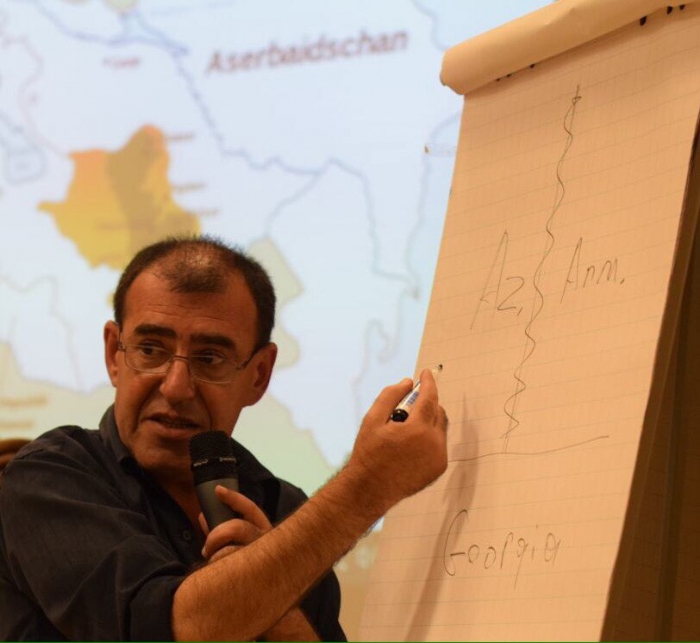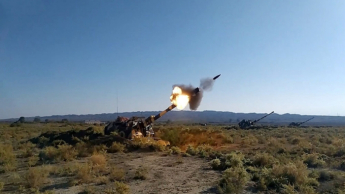How can the work on the peace agreement between Azerbaijan and Armenia be accelerated? - Interview with Vanyan

Armenian human rights activist Georgy Vanyan gave an exclusive interview to Baku Tribune.
Armenian human rights activist Georgy Vanyan gave an exclusive interview to Baku Tribune.
- President Ilham Aliyev said that Azerbaijan is ready to work on a peace agreement with Armenia. “We hope that after the elections in Armenia there will be more clarity on this issue. The peace agreement provides for the recognition of the territorial integrity of both countries, and we are ready for this, ”Ilham Aliyev wrote on Twitter. How do you assess the prospects for concluding a peace agreement between our countries?
- The peace agreement, of course, is based on the recognition of territorial integrity, and this primarily concerns Karabakh. Despite the speculations, today's border problems between Armenia and Azerbaijan are secondary. Fundamentally, the prospect of resolving the conflict has always been and is today. But, like all citizens of our countries, I need specifics. And there is no specifics. Neither side has so far detailed the procedure - what should be before a peace agreement, and what will be in the process of its implementation. As a human rights defender, I am interested in humanitarian issues.
Does Azerbaijan need new citizens of Armenian nationality at all? Specifically, now and specifically these people are former citizens of the Azerbaijan SSR and their children; refugees from the Azerbaijan SSR and their children; citizens of Armenia who, for one reason or another, moved to the conflict zone, and their children. Now they live in Stepanakert (ed. Khankendi) and other areas of the former Nagorno-Karabakh Autonomous Oblast under the protection of Russian peacekeepers.
And the situation is such that these people - the civilian population - became the factor that served as the basis for the military presence of the Russian Federation in Azerbaijan and the strengthening of the military base of this country in Armenia. Now the situation continues to be, if not military, then violent. People are still a bargaining chip in political bargaining. When I speak today about the humanitarian consequences of the 44-day war, the Azerbaijanis answer me with the facts of war crimes of the 90s and subsequent years. A vicious circle is created. Both on social networks and at the highest state level, the situation is the same. We are talking about each other, not with each other. The lessons of the war have not yet been learned.
- What factors, in your opinion, could speed up the process of starting work on the conclusion of a peace agreement?
- Now many say that Armenia has surrendered. This concept also includes rejection of the idea and arguments that she used in the conflict. It's no secret that this did not happen. On the contrary, at the international level, and in the statement (ed. the trilateral ceasefire agreement of November 10, 2020), the issue of the security of the civilian population was enshrined. After all, the peacekeepers, in their mission, are not protecting the leadership of the unrecognized "republic", they are protecting the people. First of all, this question must be removed. The Armenian authorities should be held responsible for the mediocre policy, for sending their citizens to the meat grinder. And this responsibility does not consist in the issuance of cash benefits for the families of the victims. This responsibility is much greater.
The Armenian authorities must do everything to prevent the freezing of the conflict, although today it is quite in their interests. As I understand it, the leadership of Azerbaijan, which won the war, on the contrary, should be interested in acceleration. But today everything works for freezing, the alternative to which can only be a new war. Unfortunately, the chances for an ideal option are very small, but nevertheless, I will note my vision of this ideal.
First, external players, in particular Russia, should abandon the role of arbiter and make efforts to organize direct negotiations between the leaders of Azerbaijan and Armenia. Secondly, our countries will need to deal with the Soviet past, we need to clarify at the legal level with each other a single concept concerning sovereign borders. FSB-guarded corridors should be replaced with lightweight border control procedures.
Secondly, a roadmap should be developed and published bilaterally to address the security issues of the Armenian population of the former Nagorno-Karabakh Autonomous Oblast and those families who lived in seven regions around Karabakh. People need to be given a specific tool for a safe existence in Azerbaijan, without threats to their life, freedom, property. Both leaders should be guarantors of this mechanism, and they will need to reconsider their priorities.
- Is the Armenian society ready today for peace with Azerbaijanis? How do Armenians generally react to the possibility of concluding a peace agreement with Azerbaijan?
- In Armenia, the processes of the division of power, which began even before the war, continue. They talked a lot and continue to say that the Armenian society is shocked by the defeat. I don't know, maybe some activists of the Diaspora, especially the Russian one, are still in shock ... but here, as during the war, the struggle for power is in full swing. The hundred figures, which are usually called the Armenian society, create only an informational background for the reshuffle at the top. A peace agreement is out of the question in the public arena. Moreover, as you can understand, everyone assumes that they will negotiate with Russia, or, at worst, with the West on Armenian issues. True, there are rare figures who very carefully and with a vague remark “sooner or later” hint at the possibility of a conversation with Turkey and “even” with Azerbaijan. I really hope that a more serious discussion of the future of Armenia is taking place on the sidelines of the authorities and the opposition. After all, our citizens are not only tired, but finally have seen the light. Few people already believe in the existence of the Armenian elite, which knows how to solve the country's problems.
- Early parliamentary elections are scheduled for June 20 in Armenia. What are the expectations of the Armenian society from these elections?
- Firstly, these elections have been appointed by order of the formers. Once again, our authoritarian rulers decided that the people should dance to their tune. These elections will only prolong the period of anarchy in Armenia. Whatever the alignment in parliament, today everyone understands that this anarchy will continue. Each political force will take a plot for itself and will continue to work to expand its power. And people just want there to be no war.
- How do you assess the chances of acting Prime Minister Nikol Pashinyan in these elections?
- He has a good chance. Our country is forced to exist for the time being without democratic institutions, with limited national sovereignty. Nikol Pashinyan rose to prominence on the wave of populism as a reformer. I think voters want to keep it, at least as a symbol of their small victory. At the moment, this is the only thing they can do to protect themselves.
Seymur Mammadov
The Rocket and Artillery formations of the Azerbaijan Army conduct live-fire exercises in accordance with the combat training plan for 2021, the Ministry of Defense of Azerbaijan told Baku Tribune.
LAST NEWS






.jpg&h=67&w=67&zc=1&q=100)













